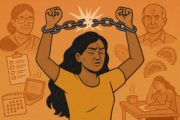There’s no time like the present to renegotiate sharing the burden! This International Women’s Day, let’s take a moment to talk about time, life tasks, self-care and society. We take a closer look at ways that women can let go of the burdens that’s weighing them down when it comes to life, work, culture and the world they live in!
Dr. Monica Vermani is a Clinical Psychologist specializing in treating trauma, stress and mood & anxiety disorders, and the founder of Start Living Corporate Wellness. She is a well-known speaker, columnist and advocate in the field of mental health and wellness.
Her upcoming book, A Deeper Wellness, is available for pre-sales now and her in-depth online self-help program, A Deeper Wellness, offers powerful mental health guidance, life skills, knowledge and healing, anywhere, anytime. https://www.adeeperwellness.com/ https://www.drmonicavermani.com/
While in the past several decades, traditional roles of women have evolved to include jobs, careers, and significant and necessary financial contributions as wage earners in families, traditional household and family tasks, chores, and responsibilities, including those of house cleaning, laundry, shopping and preparing meals, childcare, eldercare and other unpaid responsibilities like planning vacations and buying gifts, clothes, appliances that need to be replaced as well as the ‘executive’ tasks of planning and juggling schedules, activities, social events, meals, remain unevenly on women.
A Long Way To Go
While women have made great strides in the workplace, on the home front, there still exist some shocking inequities, and we still have a long way to go. Women today in traditional households, according to a 2017 Statistics Canada survey exploring unpaid household tasks, spend 50% more time than their partners/husbands on unpaid chores and responsibilities. This gap in sharing household and life task responsibilities is causing significant personal strain and diminished satisfaction in couples and family life. Both partners suffer from negativity as one is upset and the other is targeted and often criticized.
Limited Resources
The reality is this: We all have life tasks and responsibilities … and while having a family is one of the great joys in life, it comes with a great many responsibilities, some of which are labor-intensive, repetitive, and time-consuming. And the reality is this: our time and energy are limited resources. There is only so much time in a day, and so much energy to tend to the needs of others. While the people we love are not a burden, caring for children and/or an aging family member — often at the same time — while juggling the demands of a career and running a home can be daunting. And the many tasks of managing life responsibilities can feel overwhelming, burdensome, repetitive, and frustrating when they are unfairly distributed.
As women, we often place ourselves last on our to-do list, and sacrifice rest, sleep, and our own self-care. While it is wise to read about and try to integrate strategies to schedule self-care and downtime into our lives, even this can feel burdensome, and can even add more pressure to an already exhausting and daunting schedule. And when we fall short or fail at our own self-care, we blame ourselves.
Maybe it’s time for a new way forward.

A New Way Forward
Couples with household labour divided equally have more time for each other, are happier, and respect each other as people more. Shared equally, couples find better solutions to better the family unit. Brigid Schulte, director of the Better Life Lab, a work-life, gender equity and social policy program at the New America think tank, and author Overwhelmed: Work, Love, and Play When No One Has the Time, believes that it is high time we begin to reframe and redistribute household tasks that traditionally fall onto women.
In a 2020 NPR interview, Schulte explained that, when it comes to negotiating the division of household tasks, traditional heterosexual couples and households can take a lesson from same-sex counterparts, who: “make the same decisions as other couples about how to combine work and family, and there’s far less stress, tension, hostility. And the main reason why is because they cannot make assumptions based on gender, so they have to communicate.”
Implicit Bias In Play
With even the best of intentions, so many families find themselves at odds, and out of balance when it comes to sharing household chores and responsibilities. The reason for this can be summed up in a single phrase: implicit bias. Implicit bias, a term that is often used these days, refers to biases we may have but are unaware of. We grow up with traditional parents and so many times unconsciously we repeat traditional roles — where a woman’s place was in the home, and the man’s in the workplace.
While times have changed, and single-wage-earner households are no longer the norm, out-of-date notions about women’s work in the home persist. It is time to realize that times have changed, and it’s time for families to rethink the distribution of tasks, and create a new way forward as a team.
Sharing The Burden
Couples and family units are teams… and every great team needs a great strategy and game plan to succeed … one on the same team. What do teams do? They create plans, support one another, and work on a common goal. When it comes to building a strong family team — one that shares tasks and responsibilities, and understands the common goals — it is critical to be clear to succeed in family life.
A good team that works together begins with healthy communication about sharing the burden of daily and weekly tasks and responsibilities. Healthy communication involves listening to and respecting team members, and showing compassion and support when it’s needed.
Healthy communication strategies and skills each of us need to be aware of include actively listening and observing — even when your team members become emotional, defensive, or combative. Great team strategies include:
- Avoiding power struggles. Remember, the goal is to help one another succeed, and share tasks efficiently, in support of maintaining love and compassion with your partner and family members.
- Learning to agree to disagree, and staying focused on the results and solutions to look for.
- Responding with compassion, rather than reacting. We sometimes say things we regret and create distance when we react in anger or frustration, rather than respond with compassion.
- Resisting the urge to personalize or lay blame during highly emotional moments. Especially when we’re exhausted, stressed and feeling overwhelmed with anxiety, responding in compassion will result in a better outcome. Be fair and in control of your own mood, stress level, and anger toward your partner.
- Showing affection when communicating about tough subjects.
- Asking questions, finding solutions, and taking actionable steps.
- Being sincere and honest in your interactions and ideas.
- Bringing in third-party supports and interventions, like couples therapy, when you are unable to navigate the changes you wish to make. A neutral party can facilitate healthy communication and lead to life-enhancing compromises on the home front.

Good For All
As parents, we are role models for our children. They observe us and learn how to be in relationships, how to stand up for ourselves, and how to create a healthy, supporting equitable, and fair family unit.
This International Women’s Day, let’s begin to rethink and rework the sharing of household tasks and responsibilities. There is no need to do it all ourselves. And remember, the changes you make today, will play out, not only in the lives of our daughters and sons but for generations to come!
Dr. Monica Vermani’s tips on sharing the burden.
- Negotiate a more equitable division of unpaid household labor (if you feel you need it, seek the help of a professional to lead this process)
- Assign age-appropriate tasks to children, who will benefit from making a contribution to the family, by sweeping the floor, making beds, or folding and sorting laundry
- Be less hard on yourself, if you’re feeling exhausted and something doesn’t get done to your high standard
- Stay positive, and express your appreciation as you see and feel the changes in your life
- When you are overwhelmed and depleted, move self-care a little higher up on your list of tasks
Main Image Photo Credit: www.unsplash.com
Dr. Monica Vermani
Author
Dr. Monica Vermani is a Clinical Psychologist who specializes in treating trauma, stress, mood & anxiety disorders and is the founder of Start Living Corporate Wellness. Her book, A Deeper Wellness, is coming out in 2021. www.drmonicavermani.com


















































































































